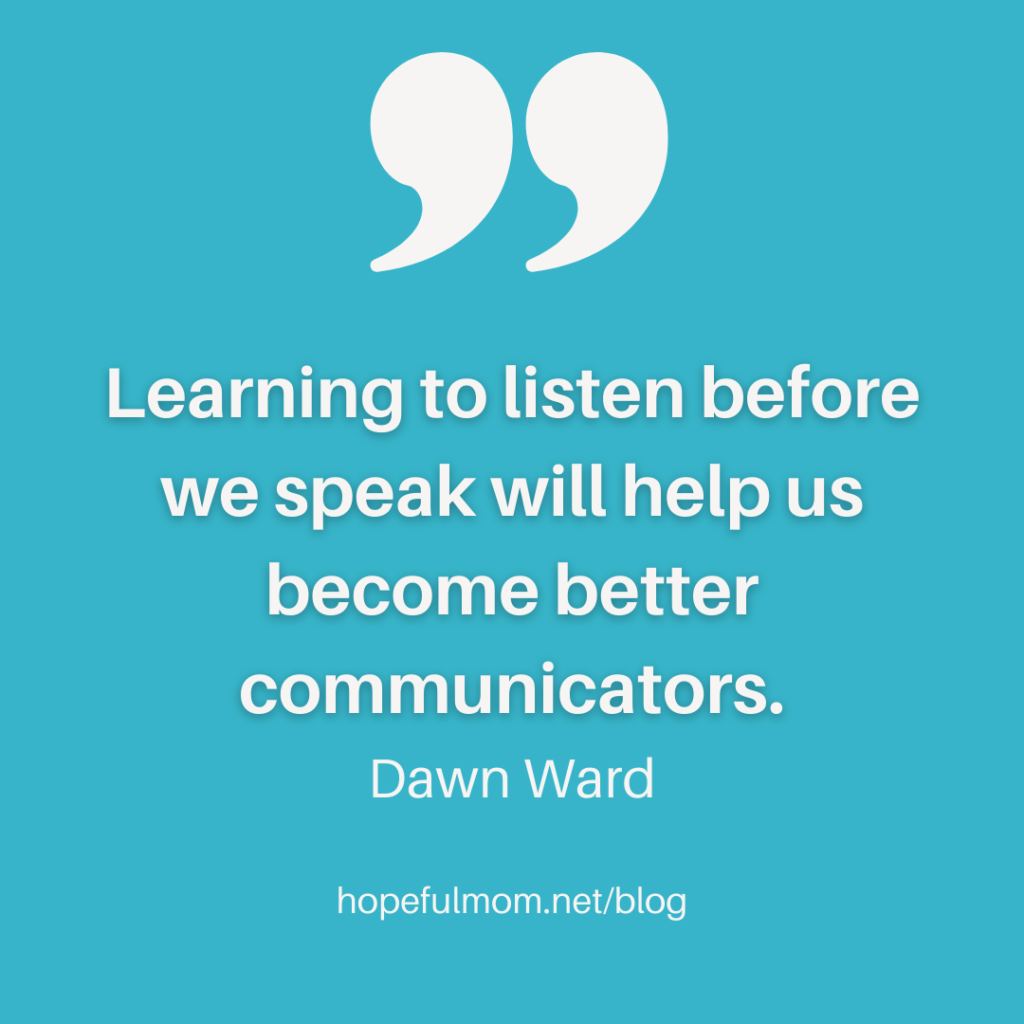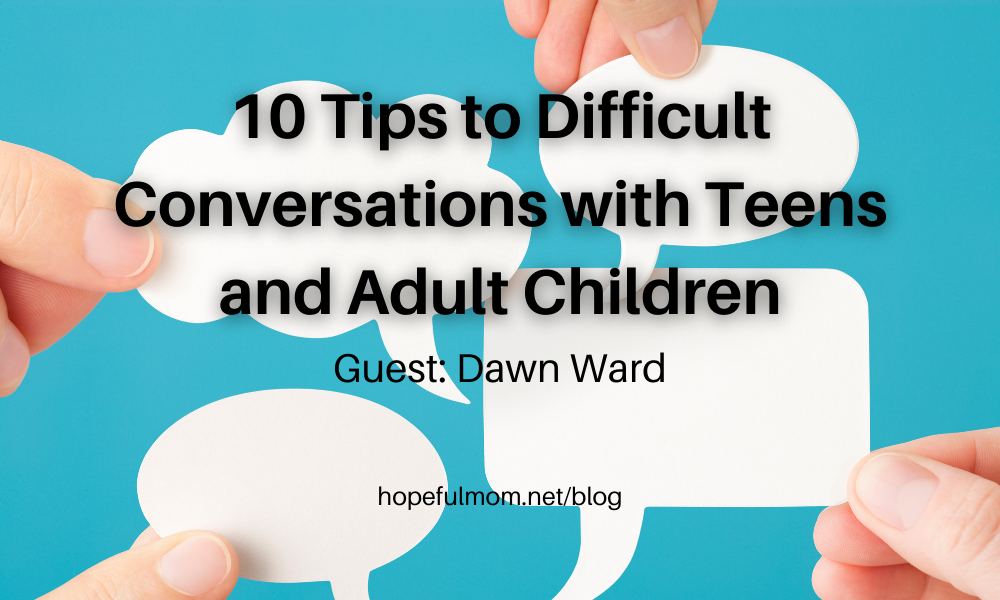I’m thrilled to introduce guest author, Dawn Ward. I met Dawn through a friend. Her website, The Faith to Flourish, is for women with loved ones struggling with addiction, mental health issues and life-destructive behaviors. As a seasoned parent, Dawn has wisdom for us about talking with our teens and adult children.
It’s difficult to talk to our children when the topics of our conversations make one or both parties squirm. I should know. I have raised two sons who struggled with addiction and destructive behaviors when they were teens and young adults. When they were kids, I could get by with a quick, “Because I said so” as an answer to their requests. Once those words came out of my mouth, they knew the discussion was over. End of argument.
When I found out my seventeen-year-old son was using drugs, as well as viewing porn, it was the beginning of many tough conversations to come. On his eighteenth birthday, he checked himself into his first treatment center. Other than the blow-out we had when his younger sister mistakenly viewed an illicit video tape on their mutual VHS player, we spoke no other words about his watching porn. After all, the problem would take care of itself once he got treatment for his drug problem. At least, that is what I hoped for.
Speak With, Not at, Your Children
There is a verse in the Bible that instructs us to speak the truth in love. Whether your children are teenagers or young adults, this teaching is wise. I foolishly spoke at my children instead of with them when having difficult conversations. Out of fear and frustration, I would make threats, set unreasonable boundaries, and try to manipulate them into doing what I said, even if it was only to appease myself.
My “helpful” words fell off deaf ears as their eyes searched the room for the nearest exit. A quick, “Uh-huh. Okay, Mom” was suffice for them to make their escape before another lecture started.
Over the years, I had much to learn about how to have conversations with my sons about their addictive and destructive behaviors. Because old habits die hard, I had to seek professional advice to learn to communicate effectively.
While I loved my sons with my whole heart, I did not always speak lovingly. I often blurted out my case in frustration and anger. “Get help or get out!” “I’ve had enough of you!” “Don’t come home until you clean up your act!” While not my finest moments, I am just keeping it real.
For many of you reading this, your children are pre-teens or teens. The sooner you learn how to engage in productive conversations with your kids, the easier it will be to maintain your composure as they get older. The control you have while they are still underage will shift to varying levels of influence once they reach adulthood.
“Sometimes the most important conversations are the most difficult to engage in.” ~Jeanne Phillips
Engaging in Difficult Conversations with Teens and Adult Children
Consider the following suggestions as you prepare to speak to your teens and adult children.
- Be Prepared. Educate yourself about the topic you plan to discuss. Our kids will ignore us if we do not know what we are talking about. Prepare them in advance for the conversation to avoid catching them off guard.
- Get Support. Seek guidance, preferably from a counselor or experienced parent, before having the conversation with your adult child. If possible, have someone present to serve as a mediator in the conversation.
- Practice What You Preach. If you struggle with self-destructive behaviors, get the help you need to work on yourself. Your child will always receive more from you if you address your issues as well.
- Stay Calm. Easier said than done, right? If you want to keep the lines of communication open with your teens and adult children, do not lose your cool. Before going into the conversation, be aware of words or responses that trigger tempers to flare. Consider “red light” topics. If you want the conversation to stay productive, avoid bringing these subjects up. Prepare yourself for those “hit below the belt” balls they may throw your way. Stay on topic, and if the conversation heads South, elect to finish it at another time.
- Listen As Much as You Speak. Be prepared to listen as much as you speak. Our children want to know we are listening. They want to feel validated. While we may not accept their excuses, there are reasons they view porn, use substances, or take part in destructive behaviors. Learning to listen before we speak will help us become better communicators.

- Ask Questions. As I grew more effective at communicating with my children, I learned to ask questions about what they think and how they feel. Our kids want to know their opinion matters to us. I have been guilty of forcing my opinion on them, while forgetting to ask theirs. Ask the tough questions.Then wait for their answers.
- Think Before You Speak. When defensive, our adult children know how to hit us where it hurts. Before you retaliate, think about what you are about to say. Is there any value in the words you are about to spew out of your mouth? If not, save them for later. Or better yet, let them go. They may cause more harm than good if spoken.
- Be Kind. Our children are experiencing shame because of their behavior. Do not add fuel to the fire. Shaming them will not bring about positive change. Do not draw attention to their negative behavior. Instead, speak about the hope of transformation that will occur as they seek positive change.
- Set Reasonable Boundaries. Boundaries are necessary when your child’s destructive behavior affects the rest of the family. Do not make threats. Set boundaries you can keep. Boundaries are meant to protect other family members, as well as make it difficult for your child to continue engaging in harmful behavior.
- Love Them in Word and Action. Loving them means telling them you love them and believe in them. It also means being honest with them about your concerns. Loving them means doing the hard work, making tough decisions, and having challenging conversations when necessary.
I have learned valuable lessons along the way as I ministered and listened to moms of addicted children that have helped me to have more productive conversations with my sons. I hope you find these suggestions helpful when speaking with your teens and adult children.
Thanks for spending time here. Please share this post on social media, as you may be helping another parent struggling to keep up in this digital age. And be sure to subscribe below for updates on posts and my upcoming book.
About the author

Dawn Ward
Dawn Ward is a speaker, writer and blogger. She is the founder of The Faith to Flourish, a ministry that equips women to thrive by providing inspiring teaching, coaching and biblical resources to help them cultivate resilient faith, grow through adversity and live transformed lives.
As part of the mission of The Faith to Flourish, she also ministers to women with loved ones struggling with addiction, mental health issues and life-destructive behaviors. Dawn is the co-author of the book Still Standing After All the Tears Workbook: Faith in the Battle Edition. She has been married to her husband, Steve, for over forty years and is mom to three adult children. It is her passion to help all women grow in their faith as they learn to better understand the Bible and how to apply it to their lives.



One Reply to “10 Tips to Difficult Conversations with Teens and Adult Children”